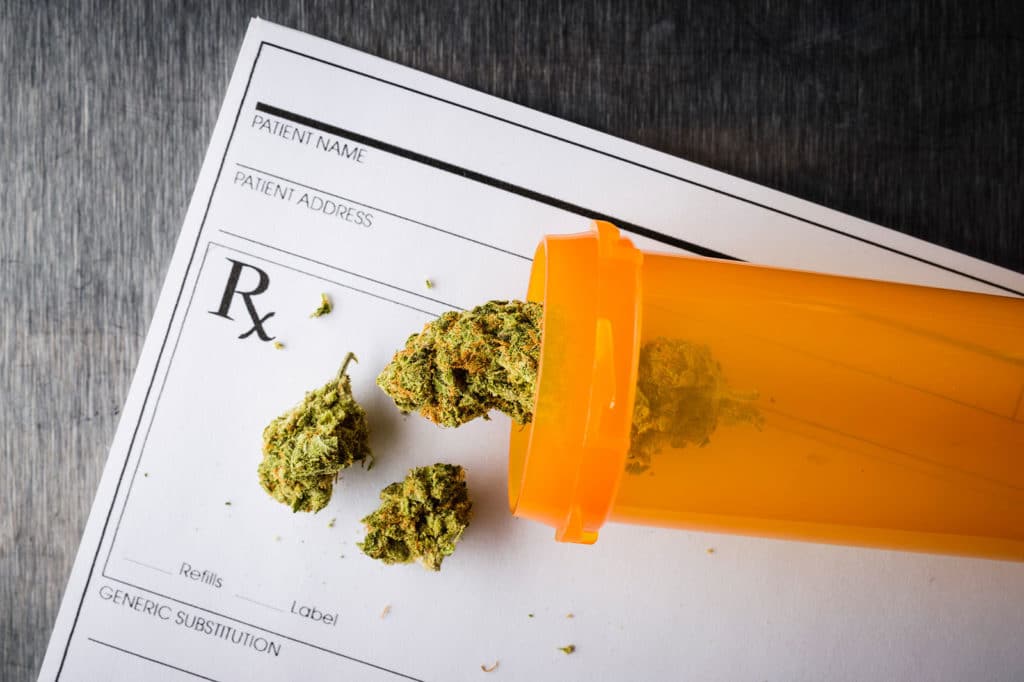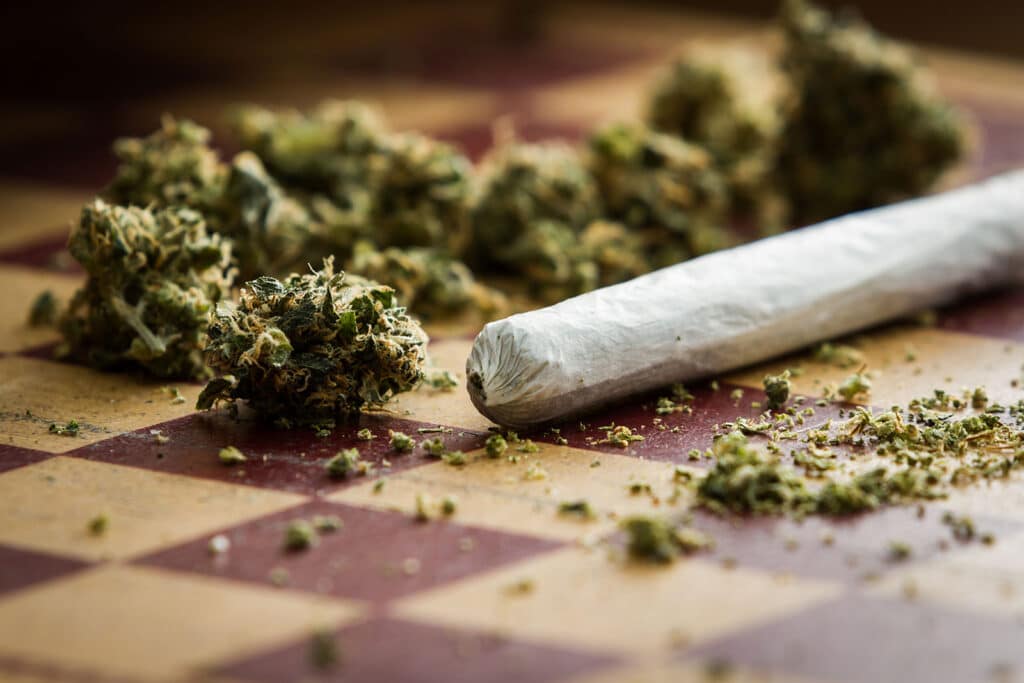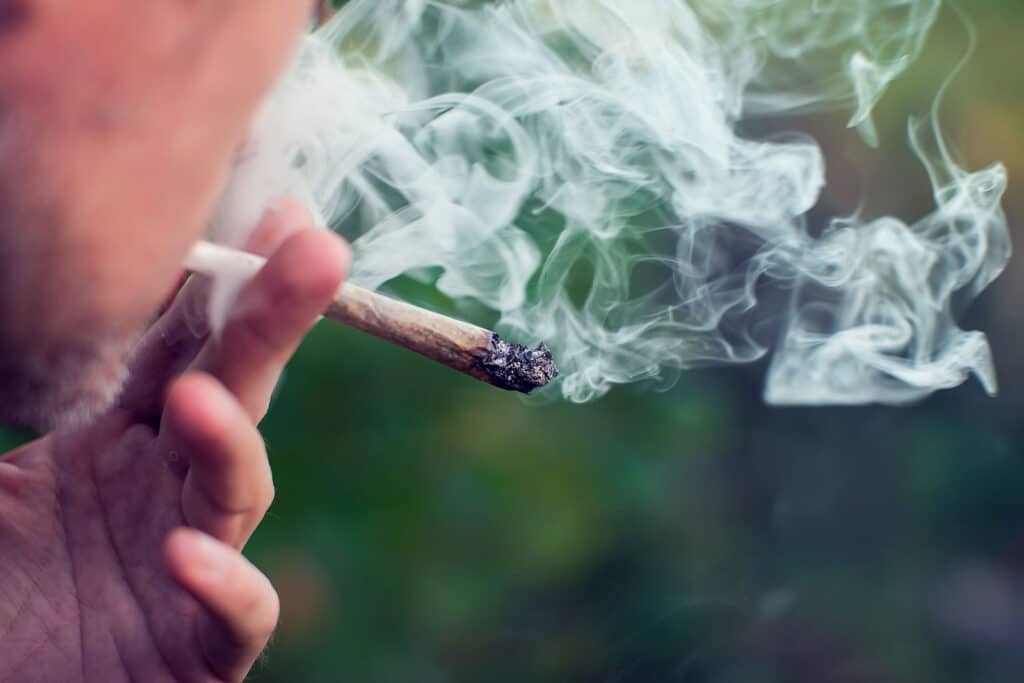More than 12% of New Jerseyans over 21 use marijuana for medicinal or recreational purposes, according to the New Jersey Cannabis Regulatory Commission.
Of this, nearly 30% obtain marijuana from unregulated sources. This is concerning because unregulated marijuana often lacks quality control in terms of potency, purity, or potential contaminants, increasing the risk of marijuana addiction.
That said, even marijuana purchased from legal sources can be addictive for some users. In fact, research suggests that 1 in 11 adults who use marijuana will develop an addiction at some point in their lives.
If you live in or near New Jersey, stick around. This article discusses everything you need to know about marijuana treatment in New Jersey, as well as the signs and symptoms associated with cannabis use disorder (CUD).
Is Marijuana Addictive?
Though generally considered less addictive than substances like alcohol, stimulants (cocaine, methamphetamine), or opioids (heroin, fentanyl, morphine), marijuana still possesses addictive properties that can trigger severe dependency in some individuals.

According to research, around 1 in 11 adults (9%) who use marijuana will develop a cannabis use disorder (CUD). The risk is even higher with adolescents and people under the age of 18, with approximately 1 in 6 (17%) developing CUD.
Marijuana is a psychoactive drug, and like most psychoactive drugs, it stimulates the part of the brain that responds to pleasure, like food, sex, and enjoyment.
Marijuana’s main psychoactive ingredient, THC (delta-9-tetrahydrocannabinol), triggers the release of dopamine, a chemical that makes a person feel euphoric and relaxed.
With continued use, the brain rewires itself to depend on THC to release dopamine. Everyday activities that would usually make a person happy, like spending time with loved ones or pursuing hobbies, become less pleasurable without marijuana.
As a result, individuals may turn to marijuana more and more just to feel “normal” or experience a sense of enjoyment. This dependence on marijuana is what leads to marijuana addiction.
What Is Cannabis Use Disorder (CUD)?
In simple terms, cannabis use disorder (CUD), also known as marijuana addiction or cannabis addiction, is a medical condition that develops from long-term use and misuse of cannabis. People suffering from CUD continue using marijuana even if it causes them physical, mental, or social problems.
Signs and symptoms of CUD include:
- Increased use of cannabis within a short period
- Neglecting responsibilities at school, work, or home due to cannabis use
- Intense and uncontrollable urge to use cannabis, even if it was just taken a few hours ago (dependency)
- Needing to use more and more cannabis to get the same effect (tolerance)
- Continued use of cannabis even though it causes problems or puts you in physical danger
Negative Effects of Marijuana Abuse
Prolonged and regular use of marijuana can lead to numerous behavioral, physical, and psychological consequences, including:
- Permanent loss of IQ
- Trouble remembering what you just thought or said
- Delayed speech or difficulty forming sentences
- Increased risk of mental health problems, such as depression, anxiety, and schizophrenia
- Suicidal ideations
- Increased heart rate and blood pressure
- Respiratory problems, such as bronchitis, chronic cough, increased mucus build-up (in the chest), and lung infections
- Impaired coordination and reaction time
Marijuana use during pregnancy is strongly discouraged because it may cause premature birth, fetal growth restriction, stillbirth, and problems with the baby’s brain development.
The chemicals in marijuana can also be transferred to a baby via the mother’s breast milk, impacting a child’s healthy development.

Can You Overdose On Marijuana?
Yes, a person can overdose on marijuana.
While there are no known records of a marijuana-induced death, people who overdose on marijuana may hurt themselves or others, sometimes fatally.
Marijuana can impair a person’s judgment and abilities, making activities like driving, operating machinery, or even walking dangerous. High doses of THC can also sometimes lead to paranoia, anxiety, or feelings of anger, which can escalate into aggressive behavior or violence.
Symptoms of Marijuana Overdose
Here are some of the biggest symptoms of marijuana overdose:
- A “white out” where a person’s face becomes pale, followed by nausea, vomiting, dizziness, and in rare cases loss of consciousness
- Uncontrollable shakes and tremors
- Dry mouth
- Increased heart rate
- Anxiety and confusion
- Paranoia
- Psychotic episodes like delusions, hallucinations, troubling or confusing thoughts, and lack of self-awareness
How Long Does a Marijuana Overdose Last?
The duration of a marijuana overdose depends on several factors, including the amount consumed, the consumption method, and individual aspects such as a person’s metabolism, weight, and tolerance level.
Generally, the negative effects of consuming too much marijuana peak within two to three hours and gradually subside over a few hours.
Naturally, the higher the dosage, the longer and more intense the side effects. Edibles also stay in the system much longer than inhaled marijuana, with some people experiencing negative effects for four to eight hours straight.
If you or someone you love experiences concerning effects after consuming marijuana, like trouble breathing, increased heart rate, or intense psychosis, seek medical attention right away.
Though not fatal, a marijuana overdose can still be dangerous. This is especially true if taken alongside other drugs, or if the person taking marijuana has a chronic health condition.

What Are the Withdrawal Symptoms of Marijuana Addiction
The symptoms of marijuana withdrawal look much like the symptoms of opioid withdrawal. This includes:
- Loss of focus
- Poor appetite
- Changes in mood
- Difficulty sleeping
- Headaches
- Irritability
- Sweating and cold sweats
- Intense cravings for cannabis
- Stomach issues, like diarrhea, vomiting, and gastritis
- Feelings of depression and anxiety
Withdrawal symptoms can range from mild to severe. The symptoms are rarely dangerous or life-threatening, but they can feel uncomfortable and sometimes even unbearable to some people.
Those who occasionally take cannabis are unlikely to experience withdrawal symptoms when they stop cold turkey. However, people who regularly indulge in cannabis, whether it be via smoking or edibles, may experience two or more of the symptoms above.
THC and other cannabinoids can take one to two weeks to completely exit the system, so it may take several days or weeks before the symptoms become noticeable.
How Does New Jersey Treat Marijuana Addiction?
New Jersey treats marijuana addiction just as seriously as other types of addiction. If you live in or near New Jersey, here are the available treatment options:
Medication
As of the time of writing, the FDA has yet to approve specific medications to treat CUD.
However, research has shown that some medications may help in managing and reducing cannabis use. They may not address the addiction itself, but they reduce uncomfortable withdrawal symptoms associated with the addiction.
These medications include:
- Dronabinol (Marinol): A synthetic drug that mimics THC but to a lesser extent
- Metoclopramide (10 to 20 mg): Treats persistent nausea and vomiting
- Zolpidem (Ambien): Short-term treatment for insomnia
- Buspirone (Buspar): Short-term treatment for anxiety and psychological distress
Cognitive Behavioral Therapy (CBT)
Cognitive Behavioral Therapy (CBT) is one of the most effective treatment options for marijuana addiction and other substance use disorders.

It’s an action-oriented and problem-focused form of therapy that teaches people how to deal with problems that come up in day-to-day life healthily and positively. It also touches upon relapse prevention methods, like meditation and self-care.
Treatment usually lasts between six to 20 sessions, with each session lasting between 30 to 60 minutes.
In marijuana addiction, CBT helps people:
- Develop coping skills to resist cravings and manage withdrawal symptoms
- Identify situations, emotions, or people that make them crave marijuana, and how to avoid or manage them
- Identify and challenge negative thoughts and beliefs that contribute to marijuana use
Motivational Enhancement Therapy (MET)
As the name suggests, Motivational Enhancement Therapy (MET) focuses on building a person’s motivation for change.
It assumes the person is on the fence about quitting and aims to help them explore the pros and cons of marijuana use and build a desire to change.
It’s different from CBT because CBT assumes the person is already motivated to quit and helps them develop skills to manage triggers, cravings, and negative thinking.
Contingency Management (CM)
Contingency Management (CM) is a reward-based therapy that aims to help a person stop substance abuse through positive motivation.
In CM, patients receive a reward for meeting certain treatment goals or, in some cases, a negative consequence if they’re unable to meet said goals.
For example, a patient may receive a voucher, cash, or another prize after a negative urine test or attending a certain number of therapy sessions.
If a patient fails a goal, they might lose the chance to enter a prize draw or have their treatment plan adjusted to more therapy sessions or stricter monitoring.
Inpatient And Outpatient Treatment Programs
Depending on the severity of the addiction, a therapist may recommend an inpatient or outpatient treatment center.
Inpatient treatments require the individual to live at the treatment facility and follow a structured treatment plan, like individual and group counseling, behavioral therapies, and more.
Outpatient treatment plans are less intensive than inpatient treatment plans. They don’t involve round-the-clock monitoring and only require the patient to attend sessions as scheduled.
Support Groups
Most treatment programs encourage patients to participate in various support groups.
One such support group is Marijuana Anonymous (MA), which follows a 12-step model similar to Alcoholics Anonymous (AA).
MA provides people struggling with marijuana addiction a safe space to share their struggles, thoughts, and concerns with people who understand. Members can share what worked for them and encourage new members that they’re not alone.

Final Thoughts
With the legalization of marijuana in 24 states including New Jersey, the misconception of ‘marijuana isn’t addictive’ is becoming more and more prevalent.
However, marijuana addiction is a real and serious thing, with some people struggling to control their use despite negative consequences.
In New Jersey, marijuana addiction is treated through various programs and behavioral therapies, including CBT, MAT, and MC.


